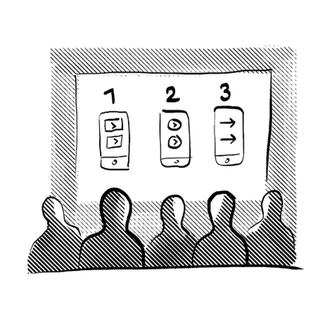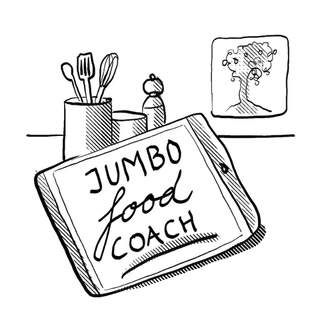Technology development: advocating the senior’s perspective
KBO-PCOB is the largest organisation for older adults in the Netherlands. It advocates a society in which older people can fully participate. According to Nora Ramadani and Jan Brinkers, technology can play an important role here. What are their experiences in developing such technology?
Technology development: advocating the senior’s perspective
KBO-PCOB is the largest organisation for older adults in the Netherlands. It advocates a society in which older people can fully participate. According to Nora Ramadani and Jan Brinkers, technology can play an important role here. What are their experiences in developing such technology?
The journey of Nora Ramadani and Jan Brinkers, KBO-PCOB
First stage
Acquiring ideas
With more than 800 local branches, senior organisation KBO-PCOB is strongly represented throughout the Netherlands. The members meet each other, exchange information and express their concerns. These meetings are an important source of information and ideas for Jan Brinkers, who, as policy adviser advocacy, deals with topics such as safety and digitalisation. ‘Our member service and the service telephone are also important for generating ideas. People can phone us daily about the things they’re struggling with.’ Colleague Nora Ramadani, project leader in the area of technology, adds: ‘We have more than 200,000 members, but no less than 750,000 people read our magazine. In the magazine, we raise current issues, and many people respond to those articles. It’s a good way of finding out what’s going on. Furthermore, we have a survey panel with 2,000 seniors. With flash polls, we can quickly discover what they think about some topics.’

Tip: guide seniors in using technology
‘Don’t think that technology isn’t meant for older adults. If you guide them well and involve their nearest and dearest, a lot of seniors will see the added value of technology.
Nora Ramadani, project leader at seniors’ organisation KBO-PCOB
Complex realities
From our collaborative partner VeiligheidNL, we received signals about falling accidents among older people. Scientific research reveals that healthy food is vital for preventing falls. The signals we received concurred well with a previous panel research by KBO-PCOB. This showed that 6 out of every 10 older adults struggle with being overweight. All of these signals resulted in LIFANA, a project within the ZonMw programme Active & Assisted Living (AAL) to develop a nutrition app for seniors. Ramadani: ‘The idea is good, but the reality is complex. Most seniors say that they know what a healthy lifestyle means, but on average, they still are overweight. When it comes to nutrition, they apparently do not apply that knowledge to themselves. It’s really hard to make people aware of this, whereas change starts with awareness.’


Spot on
A more recent idea – about sexual health – is getting a better response, Ramadani continues. ‘Talking about sex is difficult in itself, let alone discussing the theme of seniors and sex. We nevertheless wanted to highlight this topic because sexual health is part of somebody’s general health too.’ Since 2006, KBO-PCOB operates the dating platform . Ramadani: ‘However, something about sexual health and intimacy was still missing. We came up with the idea to develop an app, so people could do something with the theme anonymously. A platform where reliable, scientifically supported information about sexual health could be found, including suggestions for professional support.’ Thus, the project Anathema was born, an idea that proves to be spot on.

Lesson: added value of technology
‘It is clear that technology has added value. But you must always keep in mind where seniors’ needs lie and what the added value could be for them. They will only embrace the use of new technology if they believe in it themselves.’
Nora Ramadani, project leader at KBO-PCOB
Not all great ideas are equally promising in a subsequent stage
Read about the second stage of the journey >
Experiences and insights come together in projects
‘Our studies reveal that older adults would prefer to keep driving their cars. But they also realise that certain things deteriorate as you get older. For example, your reaction speed decreases. At the same time, we know that older people are wrongly viewed as bad drivers. Seniors do a lot to compensate for the risks, for example, by avoiding busy traffic situations or driving in the dark. Technological tools can help older adults to drive even more safely and comfortably. That would allow them to , in which we are participating.’
Jan Brinkers, policy adviser advocacy at KBO-PCOB
Second stage
Exploring opportunities
KBO-PCOB organised sessions to discuss their idea for the nutrition app with seniors. Brinkers: ‘I took part in several of these sessions. The participants were enthusiastic and saw the value of an app that helps them to eat more healthily. The aim was an app that would suggest to people what to eat throughout the week, based on their personal preferences. So we thought: this is going to work out really well, because we’ve developed this idea together with seniors. However, in the following stage – the co-creation + – the reality proved to be more complicated.’ Brinker’s message is that in the first stage, it's easy to gain the feeling that your idea has promise. But you can’t be sure until you actually develop the technology and try it out. That underlines how important it is for seniors to be involved in all stages of the process.
Lesson: attractive technology
‘Ageing does not have a good image. Nobody wants to become grey and wrinkled. So if you want to make something for older people, it is best to design it in such a way that it’s attractive for both young and old.’
Jan Brinkers, policy adviser advocacy at KBO-PCOB
Sexuality is a hot topic
An article about ageing and sexual health and intimacy in general, states Ramadani. ‘It did not mention a possible app as yet. Our intention was to see how people would respond to the article and whether they were interested in the topic. In this study, we explicitly explored various aspects of sex and intimacy. That felt quite daring, because we had never posed such direct questions before. But the response was overwhelming. It turns out that sexuality is a relevant theme for many seniors. And that they often think: Am I the only one who worries about this?’ Furthermore, there is a lack of knowledge, for example, about how certain medicines can influence your sex life. People often do not talk about this with their general practitioners and they don’t bring it up either.

Guide seniors well
'Don't think that technology is not suitable for seniors. If you guide them properly and involve their loved ones, a lot of seniors do see the added value of technology.'
Nora Ramadani, project leader at KBO-PCOB
Hundreds of registrations
There is a clear interest here, KBO-PCOB concluded. Ramadani: ‘We immediately seized the opportunity to allow people to register for the project. Even before it got started, we received several hundreds of registrations. This shows that this topic is something that really occupies seniors, but dare not talk about.’ After this good start, it’s important to develop concrete activities together with seniors. The European partners are already on board. One of them is SexLab, a Portuguese organisation affiliated with the University of Porto. Ramadani: ‘They are specifically active in the field of sexual health, conduct research and have a similar position in Portugal as Rutgers has in the Netherlands. We expect a lot from the collaboration.’
Behaviour change requires small steps
What KBO-PCOB underestimated in LIFANA, says Brinkers, is that enthusiasm for nutritional advice is not enough. Changes in eating behaviour take place in small steps. If you want to ensure that the supporting technology is actually used, you need to make the solution very flexible. And it needs to connect well with what somebody already does. Brinkers: ‘At the dietician, you start by telling your current eating habits. After that, together, you figure out what can be improved. And then you take the first step. For example, start by drinking fewer soft drinks and choosing water instead. Our lesson: don’t try to change everything in one go. We did not yet fully grasp this when we began developing the app.’
Jan Brinkers, policy adviser advocacy at KBO-PCOB
Logging in can be a hurdle
‘Make the hurdles as low as possible. Something seemingly as simple as having to log in can already prove to be too difficult. Some seniors do not even know their own email address, for example.’
Nora Ramadani, project leader at KBO-PCOB
Co-creation
A form of cooperation in which all participants exert an influence on the process and the outcome of this process.
Third stage
Developing and experimenting
Following the positive reception of the idea for the nutrition app, the development came up against the reality of daily life during the testing phase. Scientific goals began to overrule the wishes of seniors. The app was set up in a way that somebody would receive meal recommendations for an entire week. It was possible to indicate whether you are a vegetarian, but further personalisation was impossible. Brinkers: ‘In the test stage, at least nine out of ten participants said: I don’t understand why this advice from the app is better than my usual food pattern. They had enthusiastically entered their preferences. But when they received a recipe, they couldn’t add or remove anything themselves.’ The biggest problem? It was an ‘all or nothing’ solution. People had to complete the entire marathon in one go, so to speak. There was a mismatch between expectations and what the app offered.
Tip: make testing easy
‘Make testing and trying out easy. Don’t forget that older adults sometimes have a limited concentration span. So don’t give them a 6-page questionnaire.
Nora Ramadani, project leader at KBO-PCOB
Friction between science and practice
During the development of the nutrition app, a lot was invested in models for precisely calculating a user’s uptake of nutrients if the meal recommendations were followed. The app even took into account how the meal was prepared – for example, cooking or baking a tomato. Subsequently it could provide information about the improved blood levels. It was very interesting from a scientific viewpoint. But the app failed to achieve the desired effect in practice, as this approach only works if the user does exactly what the app prescribes. It is important to take into account how people really behave in their kitchen, emphasises Ramadani. There was a tension between what the scientists wanted – measuring positive health effects by influencing behaviour – and how seniors behaved when using the app.

Pitfall: too much emphasis on scientific research
‘Too much emphasis on scientific research can get in the way of a quick development process. From the necessary consent from the medical ethics committee to the design of the questionnaires: it all requires specific procedures. Whereas in practice, you sometimes want to develop something in short sprints in which seniors can provide feedback before you take the next step.’
Jan Brinkers, policy adviser advocacy at KBO-PCOB

Interaction with users
In the Anathema project about sexual health, the interaction between developers and users is better. Ramadani: ‘We are working with a group of seniors, from whom we collect quantitative as well as qualitative data + about what they consider to be important. We show them screenshots of the app and ask: what would you choose? And we ask them how they want to follow the intended programme about sexual health: entirely independently or, for example, partly under the supervision of their general practitioner? Or under the supervision of a sexologist or psychologist? Everybody has different preferences. There is a difference between just looking up information or seeking tips from others and specific guidance concerning the effect of medicines on your sexual health. With this approach, we gain an idea about which elements the app eventually should – or should not – contain.’
Qualitative data
Not numbers, but data in words. Qualitative data is used to understand concepts, thoughts or experiences.
How do you achieve impact, even if it’s just indirectly?
Read more about the fourth stage of the journey >
Continous communication about the right perspective
‘As an organisation for seniors, we represent the end users of digital innovations in the consortium. In European projects like AAL, the fact that the technical developers and researchers are sometimes located far away can be a problem. You continually need to make clear that they should keep the perspective of older adults in mind during the development process. The different focus of developers and researchers is not surprising because they are solely occupied with the app or with a certain health theme. Thus, what is obvious to us may not be evident to them, and vice versa. Therefore, as partners, you need to intensively communicate with each other.’
Nora Ramadani, project leader at KBO-PCOB
Lesson: work in small groups
‘You learn most in small groups. Quality should always prevail over quantity if you want proper feedback from seniors. It’s better to fire one well-aimed shot than to fire a random buckshot.’
Nora Ramadani, project leader at KBO-PCOB
Participation gives a sense of self-esteem
‘I once received a handwritten letter from a 92-year-old lady who had participated in the pilot for the nutrition app. She lived in Den Bosch, where a new Jumbo City supermarket had opened. The supermarket wanted to find out how older adults would respond to their range of ready-made meals, in combination with the app. This woman participated in the test for many weeks. She wrote that besides eating more healthily, she had become more active with healthy ageing in general. Besides that, she was grateful to participate in the experiment because she felt her contribution was valuable. Clearly, for seniors it is about more than simply “daring to use” the technology. They also enjoy contributing to its development.’
Nora Ramadani, project leader at KBO-PCOB
Fourth stage
Actual use in practice
On the winding path to technological innovation, a specific project does not always lead to a usable solution. Nonetheless, the lessons learned from such projects often end up in practice. The nutrition app is a good example, according to Ramadani. ‘During the project, together we acquired knowledge and experience around nutrition from various angles. Research took place, not only among seniors, but among dieticians, researchers and people from the Netherlands Nutrition Centre as well. During the project, we had contact with the supermarket chain Jumbo. The idea was that they would offer ready-made meals, which could be part of the recommendations given by the app. For Jumbo this was interesting, because the meals were part of a new concept they wanted to try out among consumers.’
Tip: be realistic about the possibilities
‘Be honest about what users can expect in the development stage of a technological solution. A prototype is not a fully functioning product.’
Seniors’ perspectives as the outcome
We collaborated intensively and learned a lot, but we have not yet managed to produce a successful application. That is to say: the intended app isn’t available on the market. However, what did happen is that Jumbo – and other supermarket chains – ultimately developed their own app. Ramadani: ‘During the project, Jumbo often told us that the progress was not fast enough for them. For us it felt a bit strange to be overtaken, so to speak, by large players like this during such a project. It feels like they’re running off with the idea that we’ve been working on together. But is that such a bad thing in the end? After all, we were closely involved in the development and this resulted, amongst other things, in their Jumbo Foodcoach app.’

Lesson: the user is key
‘What I like about the AAL programme is that end users have a central role. That is what we’re committed to, continually bring in that perspective with our collaborative partners. At the end of the day, we are doing all this for seniors. A PhD study is certainly relevant, also from a societal perspective. But what ultimately counts, is the benefits it brings for seniors.’
Jan Brinkers, policy adviser advocacy at KBO-PCOB
Impact without a commercial product
And what about the supportive technology for older drivers, one of the themes that KBO-PCOB collected during the ideation stage? That project – CARA – resulted in 3 solutions: Self-test, MyCoach and MyRoad. Ramadani: ‘MyCoach is based on existing technology for professional drivers. The software scores driving behaviour on aspects such as speed, anticipation and staying in lane. Drivers subsequently receive tips about how they can improve their driving behaviour. Unfortunately, without major investments, it is hard to convert such a tool into a product for the consumer market.’ The same applies to MyRoad, a navigation app that proposes a personalised route for seniors, for example with fewer motorways. A possible way forward is to sell these components to TomTom or Google Maps, so they can integrate the functionalities into their systems. In this way, you can create impact after all, even if you don’t market a product yourself.
Implementing with a range of ‘digitypes’
‘In my opinion it would be ideal if you could simply purchase technological innovations at a household store. And if these would be so fantastic that everybody wants to use them. But realising such a market introduction in practice is pretty difficult. I think that our main impact is realised at another level. We help developers to look at things from the perspective of seniors. That is a genuine change because a lot of technology is developed for younger men up until the age of 50. I sometimes joke that seniors are the real innovators when it comes to technology. Because if a solution is interesting and usable for them, then you have something that everybody can use.’
Jan Brinkers, policy adviser advocacy at KBO-PCOB
High-level advocacy
‘The impact of what we do can be seen at the policy level too. As senior’s advocates, we get involved in a wide range of discussions where we also bring in our experiences from AAL. The signals about the importance of car driving have become part of our discussions with the CBR about extending driving licences for seniors. By joining the discussion at a high level, we make a contribution that is ultimately translated into new legislation.’
Nora Ramadani, project leader at KBO-PCO
x